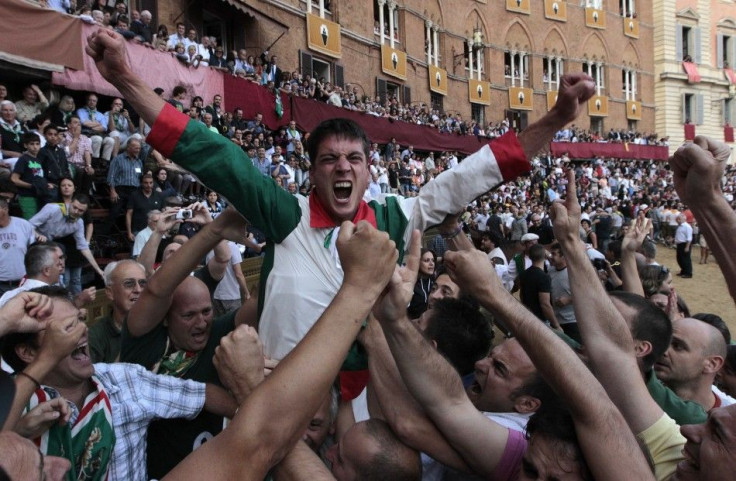Italy: A Goose Wins the Horse Race

The track was short, but the victory was immense.
In Siena, Italy Saturday, the Oca -- or goose neighborhood -- won the small Tuscan city's biannual horse race called Il Palio. Clad in red, green and white, the Oca rider and horse were the fastest of ten to run three times around the town's small, angular medieval square, the Piazza del Campo.
Oca supporters rushed the track after the victory, congratulating the horse, whose name was Mississippi, and hoisting its jockey Giovanni Atzeni on their shoulders.
Atzeni, nicknamed Tittia. has been competing in the Palio since 2003. He has jockeyed for seven different teams, winning twice, both for Oca.
Siena is divided into 17 Contrade or neighborhoods, and each enters a horse and a rider in the race, although only 10 make it to the finals. The neighborhoods each have their own banners and mascots which date back to the middle ages.
The race has been pitting neighborhoods against each other for centuries, and the first Palio was run in 1656. The race rarely lasts longer than a few minutes, and the winner is determined by which horse -- not which rider -- crosses the finish line first.
Last year's winner Selva (Forest) crossed the line without its jockey, after the jockey had been thrown off mid-lap.
The July 2 race will be followed by another on August 16, as dictated by tradition.
The race is always preceded by elaborate pageantry, and the 90 second long event is a flicker compared to the week of celebration surrounding it.
A medieval parade called the Corteo Storico marches through the streets days beforehand, complete with costumed drummers and knights, flag bearers and the celebrated horses themselves.
The night before the race, each contrade throws a neighborhood-wide celebration, setting out tables and a family style dinner outside on the narrow, cobblestone streets of Siena. Race-day, local catholic priests bless horse and rider. And after a victory, the winning contrada celebrates long into the Italian night.
Sadly, the week-long festivities were marred with sadness for one contrada when the Chiocciol, or the Snail, horse fell and died in the second lap of a preliminary run Thursday.
© Copyright IBTimes 2024. All rights reserved.











